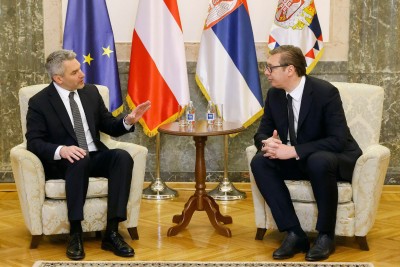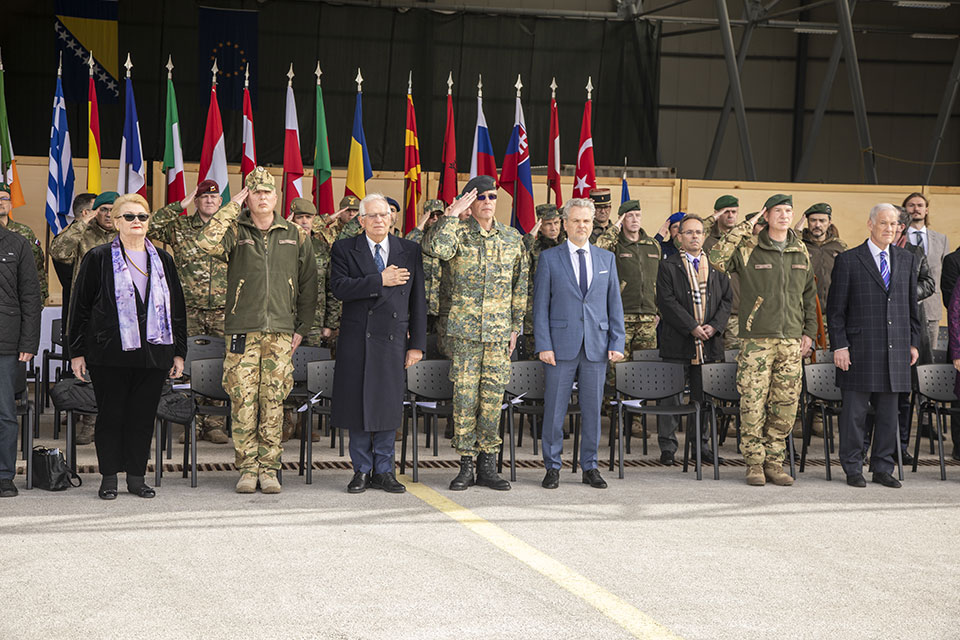Western Balkans Trip for New Momentum against Destabilization by Russia and China
The Balkans were plagued by war 30 years ago. When Yugoslavia collapsed, the first war in Europe after World War II occurred. A policy of stability in this region is particularly important, especially in the backdrop of the unprovoked Russian invasion of Ukraine. Recently Austrian Chancellor Karl Nehammer as well as many other European politicians have traveled to the Balkan states to talk to the most important politicians and dignitaries. The EU and the U.S. have long been the central players in the Western Balkans and want to counter Russia's and China's influence in the region.
 Austrian Chancelor Nehammer (l.) and Serbian President Vučić (r.) / Picture: © Bundeskanzleramt (BKA) / Dragan Tatic
Austrian Chancelor Nehammer (l.) and Serbian President Vučić (r.) / Picture: © Bundeskanzleramt (BKA) / Dragan Tatic


The Balkans were plagued by war 30 years ago. When Yugoslavia collapsed, the first war in Europe after World War II occurred. The consequences of the wars in former Yugoslavia are still felt today in the successor countries.
That is why a policy of stability in this region is particularly important, especially in the backdrop of the war in Ukraine.
The Russian invasion of Ukraine, as well as Russia's policies in general, may also have destabilizing effects on the Balkans. China's policies also threaten to be destabilizing for the region.
The EU and the U.S. have long been the central players in the Western Balkans.
Once again, the region is becoming a place where different geopolitical interests clash. Given the increasing activities of Russia and China, the EU and the U.S. face growing geopolitical competition.
Russia's policies aimed at preventing or disrupting further Euro-Atlantic integration of the Western Balkans or disrupting it is fostering instability in the region.
At the same time, China's Balkan policy suggests that Beijing is now more of a geopolitical adversary than a strategic partner.
In the case of both Russia and China, the question arises as to what kind of role model effect the two authoritarian states can have on the region, especially since the war in Ukraine threatens to have a very destabilizing effect.
The EU and the U.S. are coordinating more closely to promote a pro-Euro-Atlantic perspective for the Western Balkans.
That is why the European Union is intensifying its relations with the Western Balkan states.
Also, the Austrian Chancellor Karl Nehammer has traveled to the Balkan states to talk to the most important politicians and dignitaries there. Stable relations between the European Union and the Balkan states are important to protect peace in Europe.
The EU accession process of this region would be enormously important because of the feared destabilization of the Western Balkans by Russia and China.
Therefore prospects for accession are important so that the Balkan states do not end up in other spheres of influence.
At the beginning of his trip to the Western Balkans region, Chancellor Karl Nehammer met with the Prime Minister of Serbia, Ana Brnabić. "We cannot leave the Western Balkans to someone else. Accelerating the EU accession process of this region would be important because of a feared destabilization of the Western Balkans by Russia," the Austrian head of government stressed during his talks in Belgrade.
In this context, he said, it was also important for the EU to do its homework in the accession negotiations. "From our point of view, it is important that we stand by Serbia's side as a bridge-builder into the European Union. Because this country is an important geostrategic and geopolitical partner. I am also confident that the reservations within the EU against enlargement have now diminished," Nehammer said.
The Austrian Chancellor still held talks in Belgrade with President Aleksandar Vučić, Interior Minister Aleksandar Vulin, and Serbian Orthodox Patriarch Porfirije.
A visit to Kosovo is also planned, including a meeting with Prime Minister Albin Kurti and President Vjosa Osmani-Sadriu.
President Vučić assessed the relations with Austria as very good and reiterated "We highly appreciate Austria's strong commitment to the enlargement of the European Union and support for the European path of our country."
The interlocutors agreed that Serbia and Austria attach great importance to strengthening multilateralism and joint resistance to today's global challenges, and in this sense stressed the need to continue successful cooperation at the multilateral level.
This week, the President of the Republic of Serbia, Aleksandar Vučić, also met with the Foreign Minister of the Federal Republic of Germany, Annalena Baerbock, to discuss current issues in the region and the world, Serbia's European path, the green agenda, and the fight against climate change, economic cooperation between Serbia and Germany, and other important issues of mutual interest.
"Serbia is committed to dialogue and has not only always responded to it, but I have the impression that we contribute to the progress of this process in the best and most constructive way when there is will on all sides," President Vučić said. Minister Baerbock also addressed the situation in Ukraine. "Serbia is and remains in a position of respect for international public law," President Vučić stressed, thanking the German foreign minister "for wanting to hear Serbia's views."
The Minister of Foreign Affairs of the Federal Republic of Germany, Annalena Baerbock, pointed out that Germany will be more present in the Western Balkans in the future, and that she will continue to advocate for reaching a comprehensive agreement between Belgrade and Pristina. She pointed out that Serbia is moving along the European path with great ambitions, and that within the Berlin Process there are four ready agreements to be adopted, emphasizing that Germany and Serbia are planning a large number of joint projects and that the two countries have good bilateral cooperation, whose development will continue to be worked on.
Chancellor Nehammer met also with the head of government of Bosnia and Herzegovina, Zoran Tegeltija. "Europe has the greatest interest in ensuring that the people of Bosnia and Herzegovina can live in peace and security. We will not leave them alone in this process in any case. I expect honesty and new momentum from the accession negotiations with the EU," the Austrian head of government stressed in Sarajevo.
In Sarajevo, the program also included a meeting with the three-member Bosnian State Presidency and the Minister for Security.
The Chairman of the Presidency of Bosnia and Herzegovina (BiH) Željko Komšić and the members of the Presidency of BiH Šefik Džaferović and Milorad Dodik received the Chancellor of the Republic of Austria Karl Nehammer and emphasized the role of the Republic of Austria in the field of internal stability and security of BiH through the participation of its contingent in the EUFOR-ALTHEA Mission.
The EUFOR ALTHEA mission is an important component to ensure security and peace in Bosnia and Herzegovina.
The EU has a comprehensive approach in BiH, focusing on defense and security, development, and diplomacy. The EU is focused on reforming state institutions and helping BiH make economic progress. A strong EU Presence allows the EU to help create the conditions for achieving the long-term political goal of a stable, viable, peaceful, and multi-ethnic Bosnia and Herzegovina that cooperates peacefully with its neighbors and is irreversibly on the path to EU membership.
Members of the Bosnia and Herzegovina Presidency also received the EU High Representative for Foreign Affairs and Security Policy and Vice President of the European Commission Josep Borrell on Wednesday. The European countries want to send a strong signal and strengthen relations with the Balkans.
During his visit to Bosnia and Herzegovina, High Representative Borell thanked the Presidency of Bosnia and Herzegovina for its support of Operation Althea.
The Chairman of the Council of Ministers of Bosnia and Herzegovina, Zoran Tegeltija, met in Sarajevo with the Secretary for Relations with States in the Secretariat of State of the Holy See, Mons Paul Richard Gallagher.
During the meeting, bilateral relations between BIH and the Holy See, European integration, and regional cooperation were discussed.
The interlocutors exchanged views on the current issues in the region and the world and hoped that the conflicts between Russia and Ukraine will end soon and further disputes will be conducted exclusively by diplomatic means to achieve normalization of the general political and economic situation in the region, Europe and the world.
These meetings reflect the importance of countering the influence of Russia and China and that the EU has not forgotten its partners in the Balkans. A stable and peaceful Balkans is immensely important for the West and the security and peace in Europe.
Therefore, the United States and Croatia also emphasized a shared commitment to advance the Euro-Atlantic perspective of the Western Balkans and to see the Balkan states anchored in a free, complete, and peaceful Europe.
Both countries agreed on the importance of preserving the stability and territorial integrity of Bosnia and Herzegovina and implementing reforms toward Euro-Atlantic integration.
The United States and Croatia stressed the importance of Western Balkan countries resolving legacy and outstanding issues in the near future, as this is an essential step on their Euro-Atlantic path.
The states of the West emphasize their support for the countries of the Balkans in the direction of European integration.
One must not forget and should always be aware that Russia conducts active measure campaigns to manipulate public opinion in the Balkans. It also tries to stoke divisions within countries, among countries, or between the West and Balkan states.
Exposing Russia’s tactics - often corrupt schemes, connections with criminal elements or relationships with oligarchs - will resonate with many. Efforts to help regional governments shore up vulnerabilities to disinformation are important, including backing programs to counter fake news, improving cyber defenses and supporting efforts to promote critical thinking.
Presidency of Bosnia and Herzegovina
Council of Ministers of Bosnia and Herzegovina



